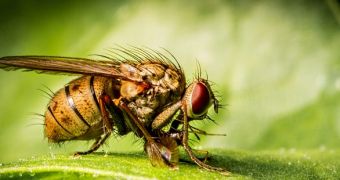Let's face it, we would just love if scientists stopped messing around with space exploration and other menial projects, got their act together and coughed out the key to immortality already. We can get back to work trying to find our siblings in outer space once we've figured out a way to live forever.
Well, as the saying goes, brace yourselves, as some researchers are actually trying to find a way to help us live longer, maybe even forever and ever. In fact, these brainiacs claims to have made considerable progress when it comes to zooming in on the long sought-after fountain of youth.
True, they have until now only managed to make a bunch of flies live way longer than they should have. Still, it might just be that, some day in the not-too-distant future, the scientists’ breakthrough that prolonged the lifespan of these insects will help us humans age slower and live longer.
Introducing the laboratory-made Methuselah flies
In a paper published in the journal Cell, the University of Bern scientists behind this research project explain that, to help the flies live longer, they toyed with their genetic makeup. Specifically, they placed one extra gene in the cells that made up their body.
This additional gene that was inserted into the flies' cells, dubbed ahuizotl, was a copy of two naturally occurring genes shown to be active in less healthy cells and to help destroy them. Together, the three ahuizotl genes managed to speed up the processes that the flies relied on to get rid of damaged cells.
As a result, the Drosophila melanogaster fly specimens that the researchers experimented on lived considerably longer than was expected of them. Specifically, the scientists documented a 50 to 60% increase in their average lifespan. This occurred because the insects aged slower.
“Our bodies are composed of several trillion cells and during aging those cells accumulate random errors due to stress or external insults, like UV-light from the sun,” study leader Eduardo Moreno explained the natural process of aging in an interview.
“Because some cells are more affected than others, we reasoned that selecting the less affected cells and eliminating the damaged ones could be a good strategy to maintain tissue health and therefore delay aging and prolong lifespan,” the specialist added, as cited by Science Daily.
All fine and dandy, but aren't we a wee more complex than flies?
Admittedly, the human body is a bit more complex than that of a fly, even if we don't have all that many hairy legs, freakishly big eyes or wings. Then again, it would seem that these researchers' work has the potential to help increase the average human lifespan by putting a leash on aging processes.
Thus, scientist Eduardo Moreno and fellow University of Bern researchers say that the ahuizotl gene that allowed the flies to live longer is conserved in humans as well. Hence, it might be possible to use it to boost the human body's ability to destroy unhealthy cells and consequently prolong life.

 14 DAY TRIAL //
14 DAY TRIAL //